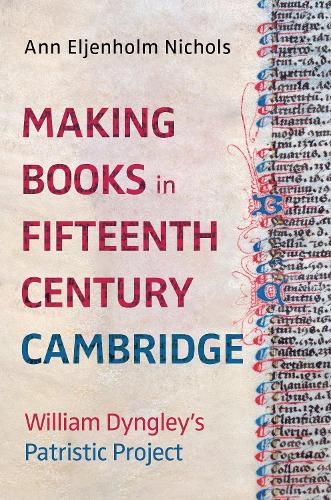Readings Newsletter
Become a Readings Member to make your shopping experience even easier.
Sign in or sign up for free!
You’re not far away from qualifying for FREE standard shipping within Australia
You’ve qualified for FREE standard shipping within Australia
The cart is loading…






Richly illustrated venture into book production in Cambridge.
William Dyngley (Peterhouse, 1393-1441), known for his personal library of at least 29 manuscripts, was primarily an editor. In the second decade of the fifteenth century, he began a major patristic project that ultimately comprised eight volumes of Augustine of Hippo, anthologies of Origin, Ambrose and Jerome, and a patristic miscellany. Dyngley also constructed thirty-five indexes for Augustine's works, which he copied in tandem with his primary text writer, the so called "Fish Scribe".
This richly illustrated monograph considers the people who made the books, the network of Cambridge scribes who copied the texts, the limners who decorated them and the remarkable man behind the project. Dyngley, placed here in the context of contemporary life in a Cambridge college, is shown to be in charge at every stage of production, acquiring exemplars, correcting scribal errors, storing incomplete quires, reassigning texts from one volume, copying and revising tables of content and tallying expenses. The volume also examines the constituent features of the manuscripts themselves, non-verbal cues as well as content. Overall, it sheds considerable new light on manuscript production in the period more generally.
$9.00 standard shipping within Australia
FREE standard shipping within Australia for orders over $100.00
Express & International shipping calculated at checkout
Richly illustrated venture into book production in Cambridge.
William Dyngley (Peterhouse, 1393-1441), known for his personal library of at least 29 manuscripts, was primarily an editor. In the second decade of the fifteenth century, he began a major patristic project that ultimately comprised eight volumes of Augustine of Hippo, anthologies of Origin, Ambrose and Jerome, and a patristic miscellany. Dyngley also constructed thirty-five indexes for Augustine's works, which he copied in tandem with his primary text writer, the so called "Fish Scribe".
This richly illustrated monograph considers the people who made the books, the network of Cambridge scribes who copied the texts, the limners who decorated them and the remarkable man behind the project. Dyngley, placed here in the context of contemporary life in a Cambridge college, is shown to be in charge at every stage of production, acquiring exemplars, correcting scribal errors, storing incomplete quires, reassigning texts from one volume, copying and revising tables of content and tallying expenses. The volume also examines the constituent features of the manuscripts themselves, non-verbal cues as well as content. Overall, it sheds considerable new light on manuscript production in the period more generally.